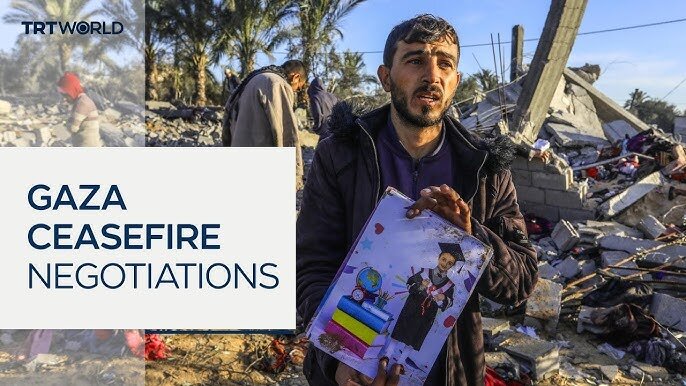Gaza ceasefire “imminent” as Netanyahu capitulates

TEHRAN – Discussions in Qatar continued on Tuesday as mediators worked to finalize a plan to end the war on Gaza.
The focus of the talks was on a ceasefire and the withdrawal of Israeli occupation forces from the enclave.
Both Israel and Hamas are reviewing a final draft proposal after a “breakthrough” in negotiations on Monday.
The White House had earlier indicated that an agreement was “imminent”.
High-level meetings were held in Qatar on Monday. The Qatari government confirmed Emir Tamim bin Hamad Al Thani held talks with Khalil al-Hayya, a Hamas leader.
The Qatari ruler also met with Brett McGurk, a National Security Council official heading U.S. President Joe Biden’s talks, and Steve Witkoff, President-elect Donald Trump’s appointed Middle East special envoy, the statement added.
Reports suggest this is to ensure that the incoming U.S. administration supports the terms of the deal.
Other reports imply Trump sent his representative to make sure the deal is in place before he assumes office next week.
Qatari Foreign Ministry spokesman Majed al-Ansari confirmed that the talks were advancing, with Qatar, Egypt, and other key parties involved.
“We believe we have minimized disagreements between both sides. Discussions now focus on final details,” he said while urging caution against premature optimism.
For months, Hamas has expressed a willingness to reach an agreement, as long as the Israelis do not add any new conditions. It has also rejected vague guarantees that the indiscriminate bombing will stop.
The Palestinian resistance has further demanded that Israeli occupation forces pull back from the enclave as part of any agreement.
Since the U.S.-backed Israeli war on Gaza started, Prime Minister Benjamin Netanyahu has insisted it would only end with the elimination of Hamas.
For over 15 months, the Israeli leader has promised to dismantle the Palestinian resistance, both its forces and its control over Gaza, calling it an “absolute victory”.
It now appears that Israel has been forced to submit to the demands of Hamas, which has proven it cannot be defeated militarily by the regime’s air, ground and naval forces.
Over the past week alone, more than a dozen Israeli soldiers have been killed in northern Gaza.
Last August, the former Israeli war minister, Yoav Gallant, told Netanyahu that his promises of “absolute victory” over Hamas were nothing more than “gibberish”.
Reports suggest the text of the deal implies a Palestinian Authority would govern the Strip in the long term but does not provide details on the structure of this authority.
Some details of the deal have been leaked to some news outlets.
Three-phase plan
The key aspects of the agreement are notably similar to a proposal that Hamas accepted in May last year, but the Israeli cabinet rejected.
The deal reportedly consists of three phases, which allow the Palestinian resistance movement to keep male Israeli soldiers captive as a bargaining chip in case Israel resumes its attacks against women, children and the elderly.
Phase 1: Immediate ceasefire and prisoner exchange
The first phase will last 42 days. Hamas will release 33 Israeli captives, including female soldiers and those who are injured.
In exchange, Israel will release 1,000 Palestinian prisoners.
Israeli occupation forces will partially pull out from the Philadelphi corridor on the Gaza-Egypt border.
Humanitarian aid to Gaza will “surge” to address the ongoing crisis.
Phase 2: Continued releases and full withdrawal
Beginning on day 16 of the ceasefire, negotiations will continue to secure the release of the remaining hostages, including male soldiers and younger male civilians.
The bodies of deceased hostages will also be returned during this phase.
Israeli occupation forces will make a “complete withdrawal” from Gaza.
Security measures will be established to ensure the safe return of residents to the northern Gaza Strip under international supervision.
Phase 3: Long-term negotiations and reconstruction
Reconstruction efforts will begin, with international aid supporting the rebuilding of Gaza’s civilian infrastructure.
Discussions will focus on long-term arrangements, including setting up a new governance structure for Gaza.
Israelis divided
The proposed ceasefire has caused division within the Israeli cabinet. Far-right police minister Itamar Ben-Gvir threatened to resign, calling the deal a “dangerous capitulation to Hamas.”
He urged Finance Minister Bezalel Smotrich to join his opposition. Smotrich has also opposed the deal but Israeli media indicate Netanyahu has met Smotrich to dissuade him from resigning.
Despite the opposition, the public opinion polls show broad support for the deal. Opposition parties have pledged to act as a “safety net” for Netanyahu to prevent a government collapse if the deal is concluded.
Families of the Israeli captives and their supporters have urged politicians not to make statements that could undermine the negotiations.
Israeli media reaction
Military analysts in the occupied territories have expressed concerns about the deal, pointing out the difficulty in dismantling Hamas’s infrastructure despite extensive military efforts. Analysts noted that the concessions to Hamas indicate recognition of the high costs of the war and the limited success in achieving military goals.
Ben Caspit, an Israeli journalist and political analyst for the Hebrew daily Maariv, discussed the political challenges facing Netanyahu.
“With all due respect to ideology, principles, ‘absolute victory,’ and all these hollow statements driven solely by fear of Ben Gvir, all of this evaporates in seconds when faced with Trump. Netanyahu has done his calculations. Dealing with Ben Gvir might be manageable, but with Trump, it will be much more challenging,” he wrote.
Yossi Yehoshua, a military analyst for Yedioth Ahronoth, Israel’s largest daily, stressed the Israeli army’s inability to dismantle Hamas’s military wing and the lack of a clear political plan for Gaza.
Yoav Limor, a senior military correspondent for Israel Hayom, a pro-government newspaper, criticized the Israeli concessions and questioned the long-term objectives in Gaza.
He noted, "The only regret is that this deal was on the table since May last year, and the delay in implementing it has cost many Israeli lives.”
